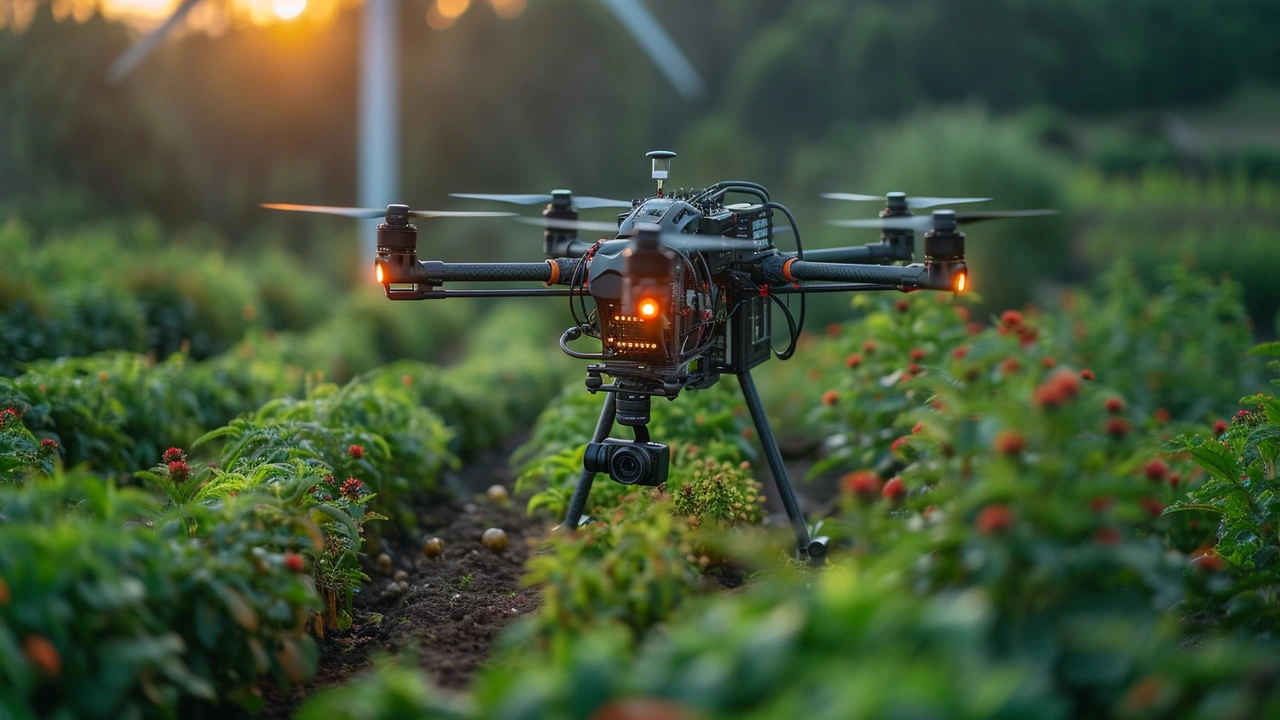
Harnessing AI for Sustainable Growth in Agriculture: The Future Unveiled
The Dawn of AI in Agriculture
The inception of artificial intelligence (AI) has triggered a paradigm shift across various sectors, and agriculture is no exception. Once reliant on traditional methods, the farming industry is now embarking on a technological journey, adopting AI to tackle some of its most pressing challenges. Whether it's about predicting the weather more accurately, optimizing crop yields, or managing resources more efficiently, AI's role is becoming increasingly significant. Today, sustainable growth in agriculture relies more than ever on harnessing the power of AI, marking a new era of farming that is smarter, more resilient, and exponentially more productive.
Imagine a farm where drones assess the health of crops from above, robots weed and harvest, and computer algorithms predict the exact amount of water, fertilizers, and pesticides needed. This isn't a scene from a sci-fi movie; it's the reality of modern farming, where sustainability isn't just a buzzword but a critical goal. AI-driven technologies are enabling farmers to meet the increasing global food demands while minimizing environmental impact, using data and analytics to drive decision making and optimize every aspect of farming, from soil health to market access.
Precision Agriculture: AI's Crowning Jewel
At the heart of AI's transformation in agriculture is precision farming, an approach that uses AI and IoT (Internet of Things) gadgets to monitor and optimize soil and crop health. Precision agriculture leverages data from satellites, drones, ground sensors, and weather stations to make farming more accurate and controlled. This methodology isn't just about improving yields; it's about using resources efficiently, reducing waste, and minimizing chemical use in crop production. With AI, farmers can analyze a wealth of data to make informed decisions, such as the best times to plant and harvest, the optimal levels of irrigation, and the precise amount of inputs needed for different parts of a field.
Moreover, precision agriculture is a testament to how AI can empower farmers to be stewards of the environment. By enabling more targeted use of resources, AI-driven technologies reduce the carbon footprint of farming operations and help in conserving water and soil health. It's a win-win situation: farmers increase their productivity and profitability while contributing to the sustainability of the agricultural ecosystem.
Robotic Farmers: The Hands in the Fields
The image of the solitary farmer toiling away in the fields is being redefined. AI-powered robots are taking on various tasks, from seeding and weeding to harvesting and packing. These robotic farmers work tirelessly, improving efficiency and precision in crop management. The integration of robots in agriculture isn't just about reducing the physical strain on farmers; it's also about overcoming labor shortages and creating more skilled jobs in the agricultural sector.
AI-driven robots come with the added advantage of being highly precise. They can identify weeds and remove them without harming the crops, apply the correct amount of pesticides directly on the affected areas, and handle fruits and vegetables delicately, reducing waste. This level of precision not only boosts productivity but also significantly reduces the environmental impact of farming practices, aligning with the goals of sustainable agriculture.
The Data-Driven Farm: Analytics for Decision Making
Data is the backbone of modern agriculture, and AI is the force that leverages this data for actionable insights. From predicting market trends to understanding consumer preferences, AI's analytical capabilities are reshaping how decisions are made in farming. Big data analytics enable farmers to forecast yields, detect diseases early, and optimize supply chain management. This not just lowers the risks associated with farming but also enhances its profitability.
Moreover, AI-powered data analytics platforms offer a holistic view of the farm, integrating data from various sources to provide a comprehensive understanding of the operational aspects. This empowers farmers to make informed decisions that enhance productivity and sustainability. By analyzing historical data, current conditions, and future predictions, farmers can navigate the complexities of modern agriculture with greater confidence and precision.
Challenges and Considerations in AI Adoption
Despite its numerous advantages, the integration of AI in agriculture faces several challenges. One of the primary concerns is the high initial investment required for AI technologies. Not all farmers, especially those in developing countries, can afford these advanced tools. Additionally, there's a learning curve associated with using these technologies, requiring training and support for farmers to fully leverage AI's capabilities.
Further, issues such as data privacy, cybersecurity, and the need for robust, high-speed internet connections in rural areas pose significant hurdles. To successfully implement AI in agriculture, these challenges need to be addressed, ensuring equitable access to technology and fostering an environment that encourages innovation and adoption at all levels of farming.
Looking Ahead: The Future of AI in Agriculture
The future of agriculture lies in the hands of AI. As technologies evolve and become more accessible, the integration of AI in farming is expected to deepen, bringing forth innovative solutions to enhance food security, sustainability, and resilience in agriculture. The journey ahead involves not just technological advancements but also policy reforms, public-private partnerships, and global cooperation to ensure that the benefits of AI in agriculture are realized universally.
Indeed, the promise of AI in transforming agriculture is immense. From empowering farmers with real-time data to enabling more sustainable farming practices, AI is the linchpin in the quest for food security and environmental sustainability. As we continue to face global challenges like climate change, population growth, and resource depletion, AI stands as a beacon of hope, offering solutions that were once considered unimaginable. In embracing AI, the agricultural sector is not just undergoing a technological transformation but is also taking a giant leap towards a more sustainable and promising future.